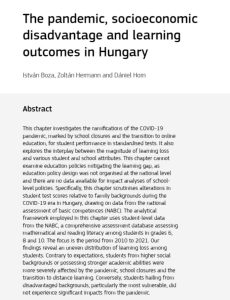The pandemic, socioeconomic
disadvantage, and learning outcomes
Cross-national impact analyses of education policy reforms
European Commission, Joint Research Centre
Schnepf, S.(editor), Volante, L.(editor), Klinger, D.(editor), Giancola, O.(editor), Salmieri, L.(editor)
Publications Office of the European Union, 2024
The COVID-19 pandemic disrupted the learning process of more than 1.5 billion students and youth around the world. The abrupt and unplanned shift to online schooling had a negative impact on student learning and achievement, with the greatest challenges experienced by the most vulnerable learners. Scientific evidence from across the globe is revealing the scale of the learning losses attributable to the school restrictions in response to the pandemic. The literature discussing the efficacy of policy interventions developed to address this generational challenge is very much limited to deliberations about reforming national education systems. Relatively little available research considers this topic from a cross-national perspective. The current volume, The Pandemic, Socioeconomic Disadvantage and Learning Outcomes: Cross-National Impact Analyses of Education Policy Reforms, provides a timely and detailed cross-cultural and comparative analysis of the relationship between pandemic-related school restrictions, learning loss and education policy development. Cases from Germany, Italy, the Netherlands, Belgium, Hungary and England provide a close examination of the pressing learning challenges precipitated by COVID-19 and its disproportionate impact on socioeconomically disadvantaged students. The chapters collected in this volume are about the application of counterfactual methods for estimating the learning loss caused by pandemic-related school restrictions. The results reported here go far beyond just monitoring learning outcomes before and after the pandemic; they contribute to our understanding of the differential impacts of pandemic related school restrictions across education systems and offer implications for pandemic-era schooling contexts, making us better prepared for future crises.



